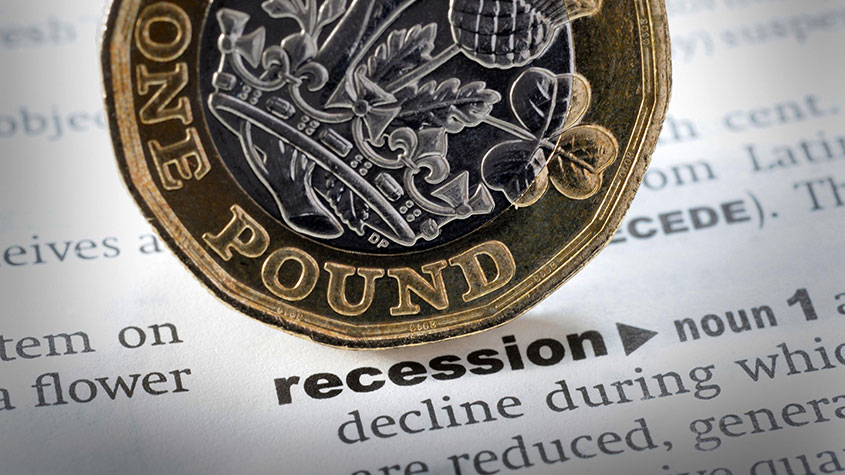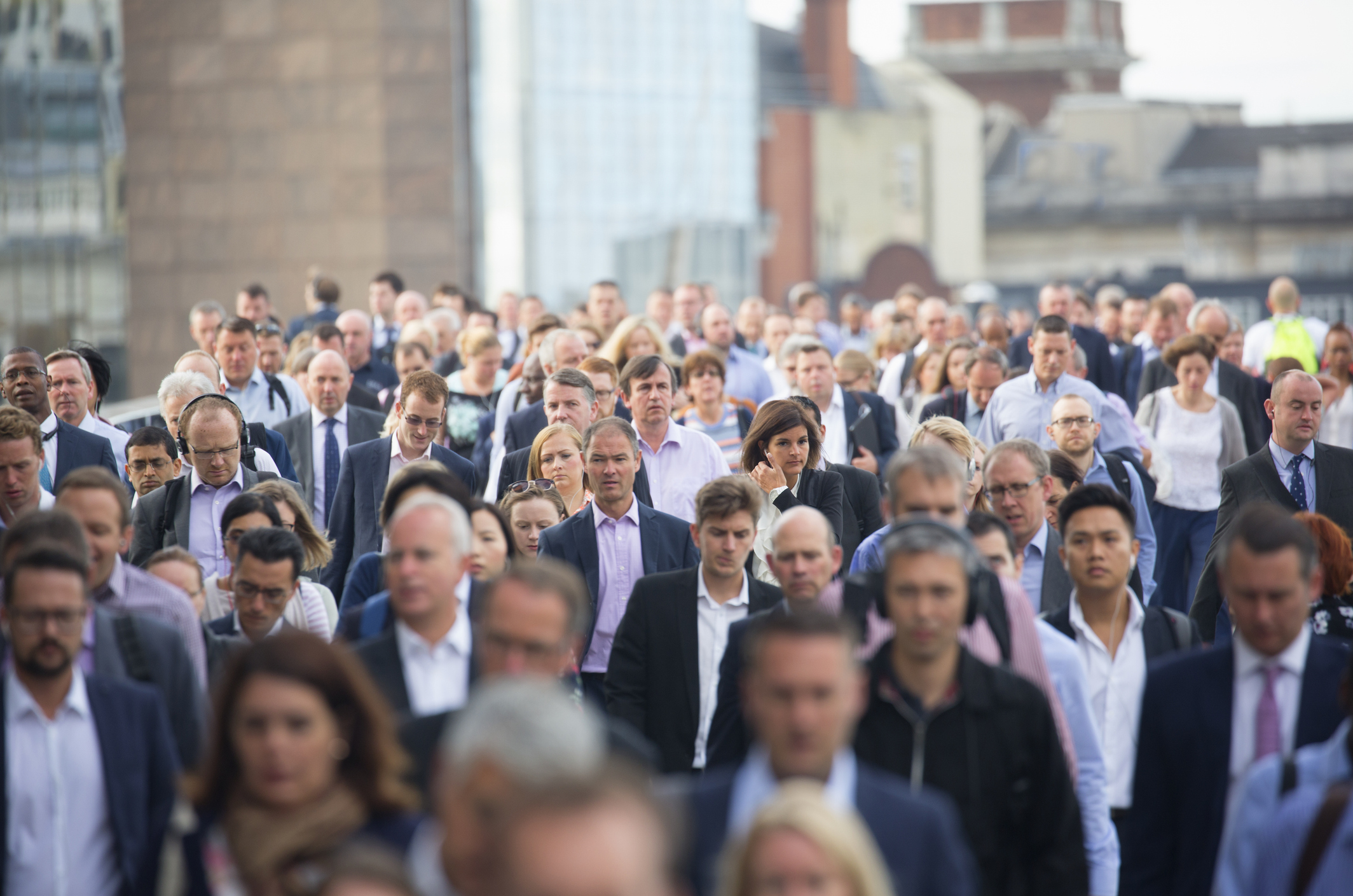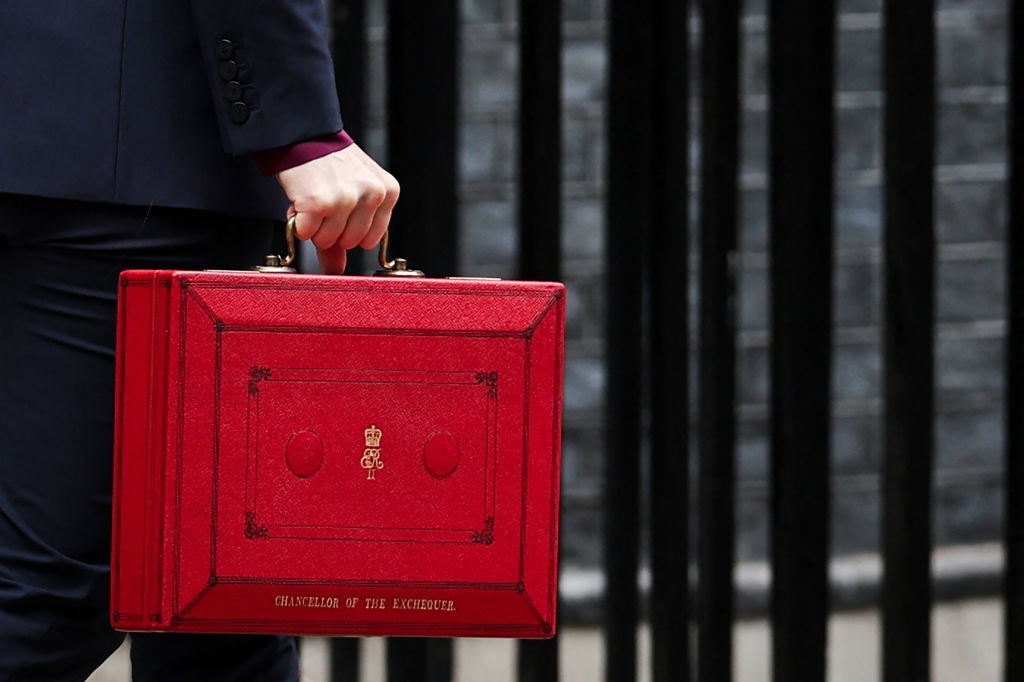What is a recession? UK impact explained
Office for National Statistics (ONS) figures show UK GDP growth has gone into reverse. But what does a recession mean?

Rupert Hargreaves

Get the latest financial news, insights and expert analysis from our award-winning MoneyWeek team, to help you understand what really matters when it comes to your finances.
You are now subscribed
Your newsletter sign-up was successful
Want to add more newsletters?

Twice daily
MoneyWeek
Get the latest financial news, insights and expert analysis from our award-winning MoneyWeek team, to help you understand what really matters when it comes to your finances.

Four times a week
Look After My Bills
Sign up to our free money-saving newsletter, filled with the latest news and expert advice to help you find the best tips and deals for managing your bills. Start saving today!
The UK officially entered a recession in the second half of 2023, official figures from the Office for National Statistics (ONS) have shown.
Following a 0.1% contraction in GDP between July and September, the economy slowed 0.3% in the final quarter of last year. It means the UK is in a shallow technical recession.
Chancellor of the Exchequer Jeremy Hunt, who will deliver the Spring Budget on 6 March, said the news was "not a surprise" given interest rates are high. He said: "High inflation is the single biggest barrier to growth, which is why halving it has been our top priority". Shadow Chancellor Rachel Reeves said it left Prime Minister Rishi Sunak's pledge to grow the economy in "tatters".
MoneyWeek
Subscribe to MoneyWeek today and get your first six magazine issues absolutely FREE

Sign up to Money Morning
Don't miss the latest investment and personal finances news, market analysis, plus money-saving tips with our free twice-daily newsletter
Don't miss the latest investment and personal finances news, market analysis, plus money-saving tips with our free twice-daily newsletter
The latest inflation figures show the UK's rate of price rises remained unchanged in January at 4%. Interest rates remain at a 16-year high. MoneyWeek has explained how to protect your portfolio during economic reversals.
So, what does a recession mean - and how could it affect you? Here's everything you need to know.
What is a recession?
A recession is when the economy contracts rather than grows. Officially, a recession is triggered when a country's gross domestic product (GDP) declines for two consecutive quarters (six months).
GDP is an internationally recognised yardstick that aims to measure the size of a country's economy. In doing so, it can help to show us how healthy (or not) a state's financial position is. It's calculated by the UK's official statistics body - the ONS - using three sets of data:
1. The value of UK economic output
2. The total amount of spending and trade in the UK economy (consumer, business and government)
3. The total amount of income across the economy (consumer, business and government)
The ONS creates estimates for each of the above by sending out surveys to thousands of consumers and businesses. It also uses government spending data. So, GDP isn't a perfect science, but it's the best measure of the economy that we currently have.
If GDP grows, it suggests more money is moving around the economy and the country is likely to be getting richer. But, when GDP falls, it's likely to mean the reverse is true.
As such, when GDP decreases to the extent that the country drops into a recession, it usually leads to high unemployment, lower spending across the economy and a drop in business activity. In short, livelihoods and businesses can be decimated.
Despite this fact, recessions are a relatively common occurrence. Over the last 50 years, the UK has seen an average of just over one per decade. Each one has varied in terms of its depth and longevity.
Why did the UK fall into a recession in 2023?
According to the ONS, which compiled the latest GDP data, the UK has gone into a recession due to a decline in output and spending.
The three biggest sectors - the drivers of the UK economy, if you will - services (-0.2%), production (-1%), and construction (-1.3%) saw their output fall. Meanwhile, consumer spending and trade volumes decreased the amount of money flowing through the economy.
However, there are factors that mean the recession may not last for long. Above-inflation wage growth has continued to beat back the cost of living crisis, while inflationary pressures (for example, energy bills) are expected to continue to ease over the coming months.
Forecasts suggest that the UK's economy will grow slightly over the course of 2024. The International Monetary Fund (IMF) projects 0.6% growth across the calendar year, while the OECD thinks it will be 0.7%.
How long will the UK recession last for?
There are signs the UK may have already exited the recession. We will not know for certain until economic figures for Q1 are released by the ONS in May.
Analysis by ING Economics said strong data from the index of Purchasing Managers suggests the reversal could be over. It said economic activity may be rising as a result of mortgage rates and an expectation of tax cuts.
ING estimates roughly two-thirds of the mortgage squeeze has passed through, meaning household incomes may soon start to recover. It also pointed out that investor expectations of upcoming Bank of England interest rate cuts could give Jeremy Hunt headroom to make tax cuts in his Spring Budget.
Both things could kick GDP into growth over the course of 2024. However, the latter appears to be growing increasingly unlikely due to the tight fiscal constraints the government is operating within.
One analyst that does not expect tax cuts in the next Budget is Capital Economics. But it said the growth in house prices - most recently seen in the Nationwide House Prices Index - means it expects the recession to be "over before long, if it isn't already".

The UK recession in 2008/09 led to a record number of business closures
Why is a recession bad news?
Recessions are bad news because they mean people and businesses are spending less. If people are spending less, companies might decide to stop hiring new staff or even let existing staff go to offset declining sales.
This can have a downward spiral effect on the rest of the economy. Companies lay employees off because revenues are falling, which in turn means consumers will have less money to spend, which then means companies will see sales decline, which ultimately means they’ll have to cut costs.
Just the talk of a recession can send a chill through the business community. No one wants to commit to a large investment project if they think demand is about to drop due to a recession. One of the concerns with the current recession is that, even though it's only shallow at the moment, its impact on consumer confidence could make the economy worse.
Ultimately, when a recession combines with the threat of higher interest rates, it can lead to tight financial conditions - a situation in which it is difficult for individuals and businesses to access credit or to obtain financing for their activities.
Tight financial conditions can have negative effects on the economy, as they can make it difficult for businesses to invest and expand. They can also reduce consumer spending, which may lead to a decrease in economic growth and potentially higher unemployment.
What does a recession mean for you?
The first thing to note about the recession news is that the economic contraction took place in the second-half of 2023. Currently, we don't know whether the UK's still in one in Q1 2024 (we won't find out until April or May). So, the chances are you may have already felt the consequences of a recession without knowing it was part of an economic downturn.
Recessions can cause a number of impacts on individuals, with the severity very much dependent on their circumstances. For some, a recession may mean losing their job or seeing their hours cut, leading to a decrease in income and difficulty paying bills.
It can also mean that businesses may be less likely to hire new employees or invest in new projects, which can make it harder for individuals to find new job opportunities.
On the other hand, a recession may also mean that interest rates are lowered, making it cheaper to borrow money and potentially benefiting those with outstanding loans. However, given the Bank of England's primary job is to keep inflation at 2%, this is by no means guaranteed for this recession. The rate of price rises remains high (but could go down as a result of the drop in economic activity).
It's worth noting that the term 'recession' itself can be a bit hit-and-miss as well because it only refers to the state of the UK economy as a whole, and does not take into account specific regions.
For example, London - which dominates the statistics as it has the highest concentration of economic output, people and jobs - may fall into recession, but other regions could actually still be in growth. The same principal may apply to different sectors and markets.
Recessions can also have different effects on people in different income brackets. Those on benefits or fixed incomes, such as retirees, are more likely to struggle. Graduates and school leavers may find it harder to get their first job, and companies might be more reluctant to give promotions or pay rises.
To guard your finances against a recession, it’s always sensible to keep at least three months' spending in a cash savings account (if you can) to act as a cushion. Searching out other ways to earn an income, or getting a better deal on your mobile bills, savings accounts and other expenses such as car or home insurance could also help you improve your financial position ahead of a downturn.
Get the latest financial news, insights and expert analysis from our award-winning MoneyWeek team, to help you understand what really matters when it comes to your finances.
- Rupert HargreavesContributor and former deputy digital editor of MoneyWeek
-
 Should you buy an active ETF?
Should you buy an active ETF?ETFs are often mischaracterised as passive products, but they can be a convenient way to add active management to your portfolio
-
 Power up your pension before 5 April – easy ways to save before the tax year end
Power up your pension before 5 April – easy ways to save before the tax year endWith the end of the tax year looming, pension savers currently have a window to review and maximise what’s going into their retirement funds – we look at how
-
 Is Britain heading for a big debt crisis?
Is Britain heading for a big debt crisis?Opinion Things are not yet as bad as some reports have claimed. But they sure aren’t rosy either, says Julian Jessop
-
 Why investors can no longer trust traditional statistical indicators
Why investors can no longer trust traditional statistical indicatorsOpinion The statistical indicators and data investors have relied on for decades are no longer fit for purpose. It's time to move on, says Helen Thomas
-
 Unemployment remains at five-year high as wage growth continues to slow
Unemployment remains at five-year high as wage growth continues to slowUnemployment in the UK held at 5.1% in the three months to November as wage growth fell again month-on-month.
-
 Is the Office for National Statistics fit for purpose?
Is the Office for National Statistics fit for purpose?Britain’s statistics authority, the Office for National Statistics, is increasingly unfit for purpose. Why, and what can be done?
-
 UK inflation forecast: where are prices heading next?
UK inflation forecast: where are prices heading next?UK inflation fell sharply in January. Is price growth expected to fall further in 2026, and when will inflation go back to the 2% target?
-
 Uncertainty ahead of the Budget causes house price growth to stall, says Rightmove
Uncertainty ahead of the Budget causes house price growth to stall, says RightmoveProperty website Rightmove says asking prices increased by just 0.3% in October, well below the 1.3% average for the month
-
 ONS: UK economy grew by ‘lacklustre’ 0.1% in final quarter of 2025
ONS: UK economy grew by ‘lacklustre’ 0.1% in final quarter of 2025The construction sector performed its worst in more than four years in the final quarter of 2025, the latest Office for National Statistics (ONS) GDP figures show
-
 When is the Autumn Budget and what should you expect?
When is the Autumn Budget and what should you expect?Chancellor Rachel Reeves is set to deliver her second Autumn Budget next week – but what exactly does the fiscal event involve?
